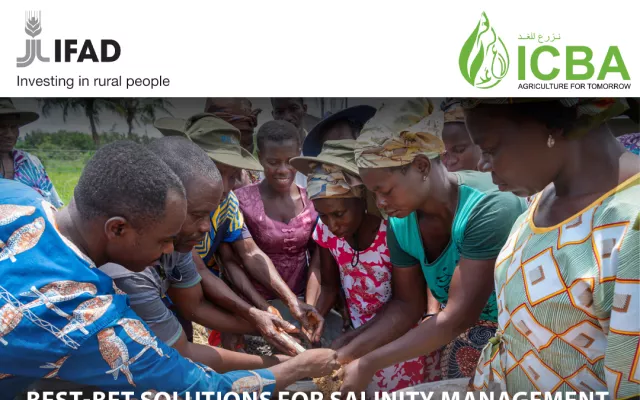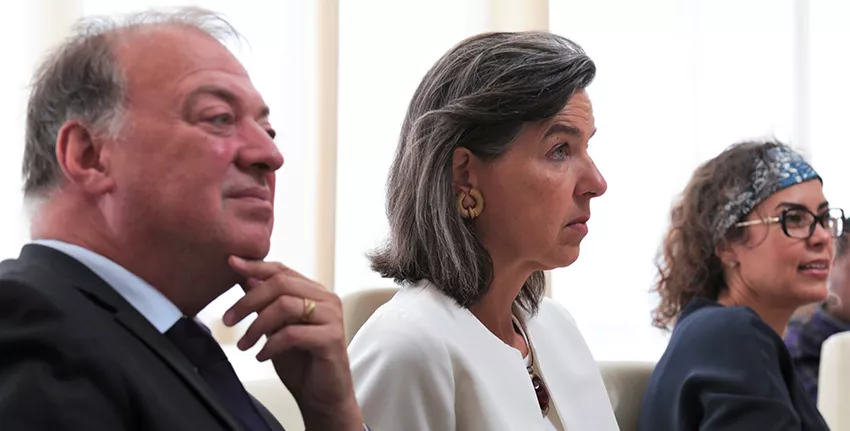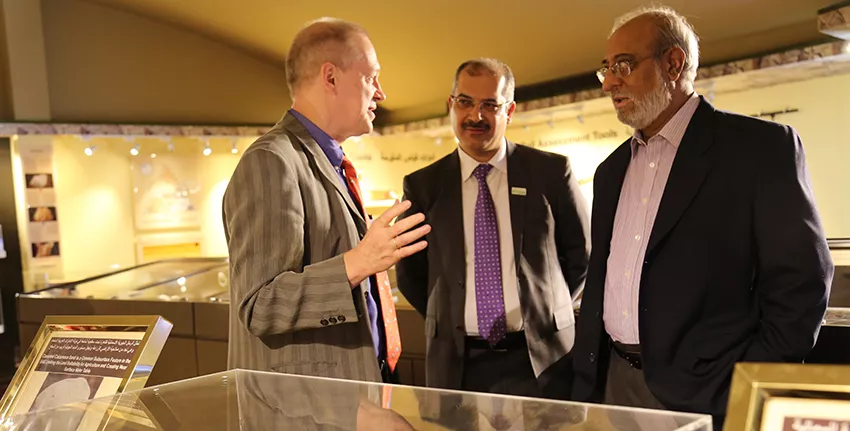ICBA’s research may be useful for Mars missions, says top Belgian astronaut
2 October 2017
On 2 October 2017 a high-ranking Belgian delegation led by Her Excellency Dominique Mineur, the ambassador of Belgium to the United Arab Emirates (UAE), visited the International Center for Biosaline Agriculture (ICBA) in Dubai to learn about the center’s research and development work and explore potential areas for collaboration.
The delegation included, among others, Astronaut Frank De Winne, Head of the European Astronaut Centre, the European Space Agency (ESA); Dr. Walter J. R. Buydens, CEO of VITO Arabia LLC; and Mr. Kris Put, Director of Flanders Investment and Trade, the UAE.
During a meeting, Dr. Ismahane Elouafi, Director General of ICBA, welcomed the delegation and briefed it about ICBA’s research-for-development programs on climate change impacts and management, policy analysis, crop productivity and diversification, aquaculture and bioenergy, and natural resources management under unfavorable environmental conditions in different regions like the Middle East, North Africa, Central Asia and the Caucasus.
Speaking of ESA’s programs at a meeting with ICBA’s management and scientists, Astronaut Frank De Winne said that he hoped it would be possible to apply ICBA’s research to missions to the moon and Mars in terms of growing vegetables in peculiar marginal environments.
He said: “As a humankind, we want to explore further. We want to have sustainable exploration of our solar system. We will need to understand how we can live and work in these uninhabitable worlds that we have like the moon and Mars in the future. The big part of that will be of course to recycle; to make sure we have clean water; to make sure we have food for the people that will live there; and see how we can use the resources that are locally available like we have here in the UAE and explore them in the best possible capabilities.”
“It was really interesting to learn about all the agricultural research that is ongoing here at ICBA. Also, the different samples of soil at the Emirates Soil Museum show how the soil can influence the growth of crops and plants, and how we can use and re-use water, how we can make sure water is safe to drink and how dirty water can be re-used for crop growth under different circumstances and which types of crops we can grow. This is all knowledge that we will also need for future exploration of our solar system,” he continued.
He also said: “We are working with ESA on several programs like, for example, the Micro-Ecological Life Support System Alternative (MELiSSA), where we see how we want to make closed-loop systems that make re-use of water, of waste, of plants, in order to create sustainable life support systems for humans. We also need to do this much more on the earth as resources are very scarce. Water is going to become more and more scarce. We need to make sure that we use these resources in an optimal way, that is what ICBA is also doing. It was a great visit and I would like to thank ICBA for support in developing a sustainable world.”
For her part, Dr. Ismahane Elouafi said: “We are honored to host this important delegation from Belgium. We identified common areas of interest such as remote sensing, climate modeling and natural resources management. ICBA - Agriculture for Tomorrow’s research agenda is of great interest to the space research. As Astronaut Frank De Winne mentioned, we will work together to take ICBA’s experience to the moon and Mars. ICBA is looking forward to collaborating with ESA to contribute to space food-related research.”
For her part, H.E. Dominique Mineur said: “I am really impressed by the discovery, research, diversity of areas ICBA is focusing on. We will be delighted to join forces with the center and find common ground for cooperation in the future.”
During a tour of ICBA’s facilities, including the Emirates Soil Museum, H.E. Dominique Mineur added: “I am extremely delighted to discover this center and the museum. I am impressed by the variety of soils and material that we can find in the UAE, which shows the diversity of the earth and diversity of the sand in the country. It has a great potential to be exploited and developed in the future.”
Dr. Walter Buydens said: “We were all pleasantly surprised to learn about the many domains in which ICBA plays a key role and is instrumental in turning marginal sites into more fertile ones. I came to understand that ICBA’s mission is quite challenging, but so necessary on a planet where we observe agricultural soils going out of production because of salinity in irrigation or groundwater intrusion or salty dust, all this next to the encroachment of cities on farm plots. On top of that, we all face and already notice the immense social burden of fighting the impacts of climate change (new crop diseases and pests; displacement of people; changes in the local hydrology...). Therefore, both for the excitement that ICBA’s team emanates and the challenges at hand, we at VITO are so eager to team up with the center and its amazing and passionate staff to jointly work on solutions.”











